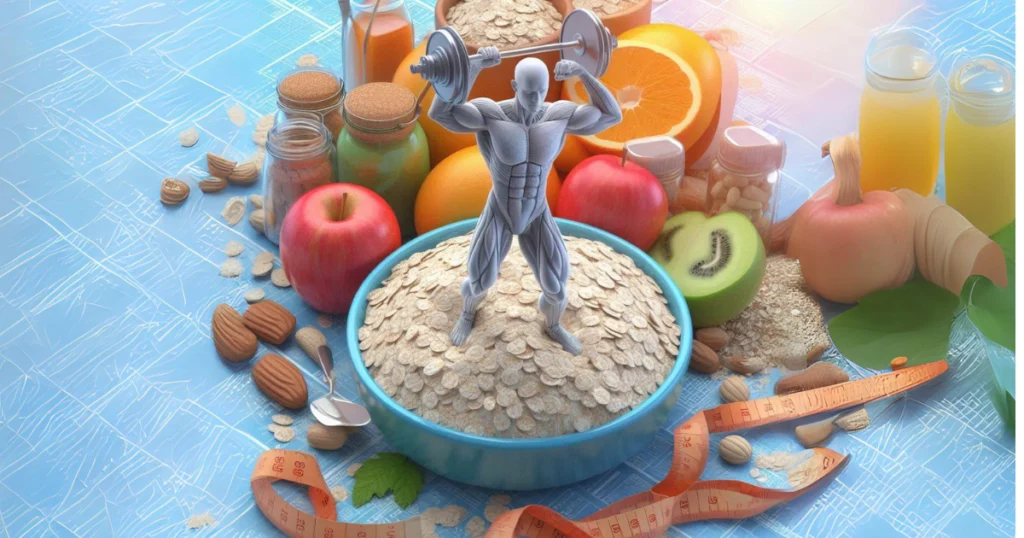
Oatmeal is a wholesome and traditional dish.
Typically, it consists of steel-cut, instant, or rolled oats in addition to fruit, milk, water, or brown sugar.
Nevertheless, various oatmeal preparations are healthier than others. Home-prepared fruit-sweetened porridge may aid in weight loss, unlike sugary instant oats that may contribute to weight gain.
Minor adjustments to your oatmeal consumption can facilitate weight gain or loss, regardless of your weight-related goals.
This article addresses the question of whether oatmeal can cause weight gain and offers simple suggestions for making oatmeal healthier.
Does oatmeal make you gain weight?
Oats’ weight-loss effects are primarily dependent on the preparation method.
Although oatmeal containing numerous high-calorie toppings, such as chocolate morsels or peanut butter, may contribute to weight gain, oatmeal prepared with minimal sugar, fruit, and water is an ideal meal for those attempting to lose weight.
This is due to the fact that it is high in fiber and contains many essential nutrients, such as magnesium, vitamin B1, and iron. Protein content may vary depending on the specific ingredients incorporated.
Oats are particularly rich in beta-glucan, a type of fiber that stimulates the release of peptide YY, a hormone associated with satiety that aids in the prevention of overeating and promotes fullness by delaying stomach evacuation.
In addition, oatmeal is rich in complex carbohydrates, which aid in blood sugar regulation and prevent appetite.
Oatmeal preparation for weight loss
To make your own oatmeal, ideally use rolled or steel-cut oats, which are lower in sugar, higher in fiber, and less processed than instant varieties. Dry-rolled oats, or 1/2 cup (40 grams), contain only 4 grams of fiber, 5 grams of protein, and 150 calories.
If you prefer instant sachets, opt for unflavored, plain products to control the amount of added sugar. You can then incorporate additional delectable, low-calorie spices such as cinnamon, vanilla, and apple pie spice.
Restricting sugar consumption helps to maintain a low caloric content and avert a rapid oscillation in blood sugar levels, which can cause symptoms such as fatigue and appetite in the immediate aftermath of a meal.
To add fiber and nutrients to your oatmeal, sweeten it with fresh or frozen fruit while preparing it with water. To increase the protein content, substitute milk for water or incorporate a teaspoon of protein powder.
Oatmeal for weight gain
Additionally, oatmeal is a great meal for weight gain because you can easily add more calories.
Choose rolled oats, steel-cut oats, or unflavored instant oatmeal as a starting point. Thus, you can incorporate nutritious, high-calorie ingredients while restricting added sugar.
Then, for additional calories and protein, substitute milk for water. Finish with nutrient-dense, calorie-rich garnishes, such as:
- Aalmonds
- Walnuts
- Flaxseed
- Hemp hearts
- Dried fruit like dates or apricots
- Natural peanut butter
- Honey
Finally, incorporate fresh or frozen fruit into your oatmeal to add a touch of nutritional value and flavor.
By increasing your daily calorie intake, these nutrient-dense ingredients assist you in achieving a calorie surplus, which is conducive to weight gain.
What about instant packets?
Avoiding sweetened instant porridge, even when trying to gain weight, is crucial. This is because these items are typically high in sugar and low in fiber.
One packet of flavored instant porridge, for instance, contains approximately 13 grams of added sugar. Given that a typical serving consists of two sachets, a meal can contain more than 26 grams of sugar.
In addition to weight gain, excessive sugar consumption is associated with cardiovascular disease and diabetes.
General recommendations for preparing nutritious oatmeal
The following suggestions may be helpful in improving your oatmeal‘s nutritional value:
- Presweetened instant oatmeal should be avoided. Opt for rolled oats, unsweetened instant oats, or steel-cut oats instead.
- Seasonings can be used to add flavor. Spices such as vanilla, cinnamon, and nutmeg impart a burst of flavor without adding unnecessary calories.
- Be mindful of portion quantities. Oatmeal contains more calories per serving of a larger size, whereas smaller servings contain fewer. In order to ascertain the caloric content, consult the nutrition label for each ingredient and portion control with a kitchen scale or measuring cup.
- Increase the protein content. After exercise, this macronutrient promotes muscle growth and aids in satiety. Protein powder, milk, Greek yogurt, and natural peanut or almond butter are all viable alternatives.
- Include frozen or fresh produce. Blueberries, peaches, and citrus contribute nutrients, fiber, and sweetness. For a flavor explosion, you may also desire to try puréed fruit, such as puréed strawberries.
The bottom line
Breakfast oats are beneficial for those who are attempting to acquire or lose weight. Regardless of your health objectives, choose unsweetened instant oatmeal or prepare your own by utilizing steel-cut or rolled oats.
Choose nutritious, low-calorie ingredients for weight loss, such as protein powder, fresh or frozen fruit, and seasonings.
Choose high-calorie ingredients such as milk, nuts, peanut butter, honey, and fresh or frozen produce if you are attempting to gain weight.
By making minor modifications to your oatmeal, you can achieve your health objectives while enjoying a nutritious meal.


